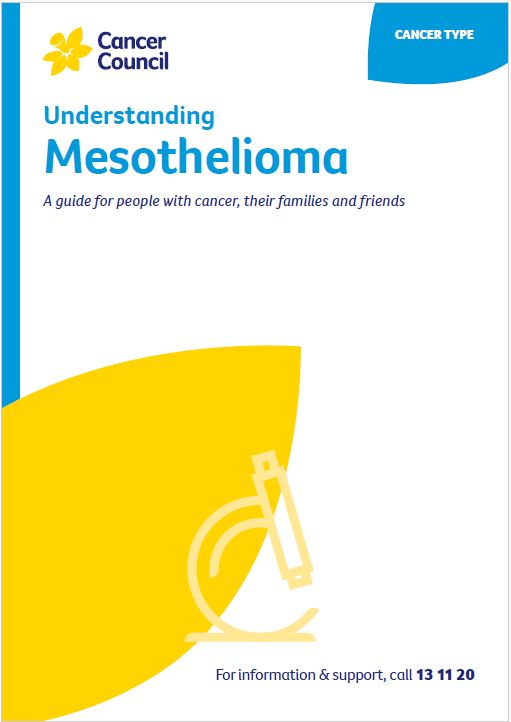- Home
- Pleural mesothelioma
- Treatment
- Immunotherapy
Immunotherapy for pleural mesothelioma
This is a type of drug treatment that uses the body’s own immune system to fight cancer.
Learn more about:
Overview
Immunotherapy drugs called checkpoint inhibitors block proteins that stop immune cells from recognising and destroying cancer cells, so the immune cells can potentially recognise and attack the cancer. Immunotherapy doesn’t always work for everyone.
Immunotherapy is now the usual first option for people well enough to have any treatment. It’s also used for people who had chemotherapy as their first treatment. However, it may not be used up-front if you are having trimodality therapy. Your medical oncologist will discuss whether immunotherapy is the most suitable option for you.
The immunotherapy drugs most commonly used are ipilimumab and nivolumab in combination. These are covered by the PBS for most people, and sometimes on workplace insurance (e.g. icare in NSW).
Learn more about immunotherapy.
Having immunotherapy
Immunotherapy drugs are usually given through a vein (intravenously) in hospital and can take between 30 and 90 minutes. You will wait a short time to be monitored for any reaction before going home. Immunotherapy may be used alone or in combination with chemotherapy.
Side effects of immunotherapy
Immunotherapy can cause inflammation throughout the body, which may lead to different side effects depending on which part of the body is inflamed.
The combination of immunotherapy drugs may increase the risk of side effects, which include fatigue, rash, painful joints and diarrhoea.
Most people have mild side effects that are easily treated and usually improve. More serious side effects may include heart and thyroid problems, but your doctor should discuss any concerns with you.
It’s important to let someone on your medical team know if you have any new or worsening symptoms, rather than just put up with them – even if they happen weeks or months after you had immunotherapy treatment. If untreated, some side effects can become serious or even life-threatening.
For a detailed list of side effects, visit eviq.org.au.
→ READ MORE: Chemotherapy for pleural mesothelioma
Podcast: Immunotherapy & Targeted Therapy
Listen to more episodes from our podcast for people affected by cancer
Video: What is immunotherapy?
Watch this short video to learn more about drug therapies, including targeted therapy and immunotherapy.
More resources
All updated content has been clinically reviewed by A/Prof Anthony Linton, Medical Oncologist, Concord Cancer Centre and Concord Repatriation General Hospital, NSW; Dr Naveed Alam, Thoracic Surgeon, St Vincent’s Private Hospital Melbourne and Monash Medical Centre, VIC; Prof David Morris, Peritonectomy Surgeon, St George Hospital and UNSW, NSW. This edition is based on the previous edition, which was reviewed by the following panel: A/Prof Anthony Linton (see above); Dr Naveed Alam, (see above); Donatella Arnoldo, Consumer; Polly Baldwin, 13 11 20 Consultant, Cancer Council SA; Dr Melvin (Wee Loong) Chin, Medical Oncologist, Sir Charles Gairdner Hospital and National Centre for Asbestos Related Diseases, WA; Prof Kwun Fong, Thoracic and Sleep Physician and Director, UQ Thoracic Research Centre, The Prince Charles Hospital, and Professor of Medicine, The University of Queensland, QLD; Vicki Hamilton OAM, Consumer and CEO, Asbestos Council of Victoria/ GARDS Inc., VIC; Dr Susan Harden, Radiation Oncologist, Peter MacCallum Cancer Centre, VIC; Penny Jacomos, Social Worker, Asbestos Diseases Society of South Australia, SA; Prof Brian Le, Director, Parkville Integrated Palliative Care Service, The Royal Melbourne Hospital and Peter MacCallum Cancer Centre, VIC; Lung Cancer Support Nurses, Lung Foundation Australia; Jocelyn McLean, Mesothelioma Support Coordinator, Asbestos Diseases Research Institute, NSW; Prof David Morris (see above); Joanne Oates, Registered Occupational Therapist, Expert Witness in Dust Diseases, and Director, Evaluate, NSW; Chris Sheppard and Adam Barlow, RMB Lawyers.
View the Cancer Council NSW editorial policy.
View all publications or call 13 11 20 for free printed copies.

